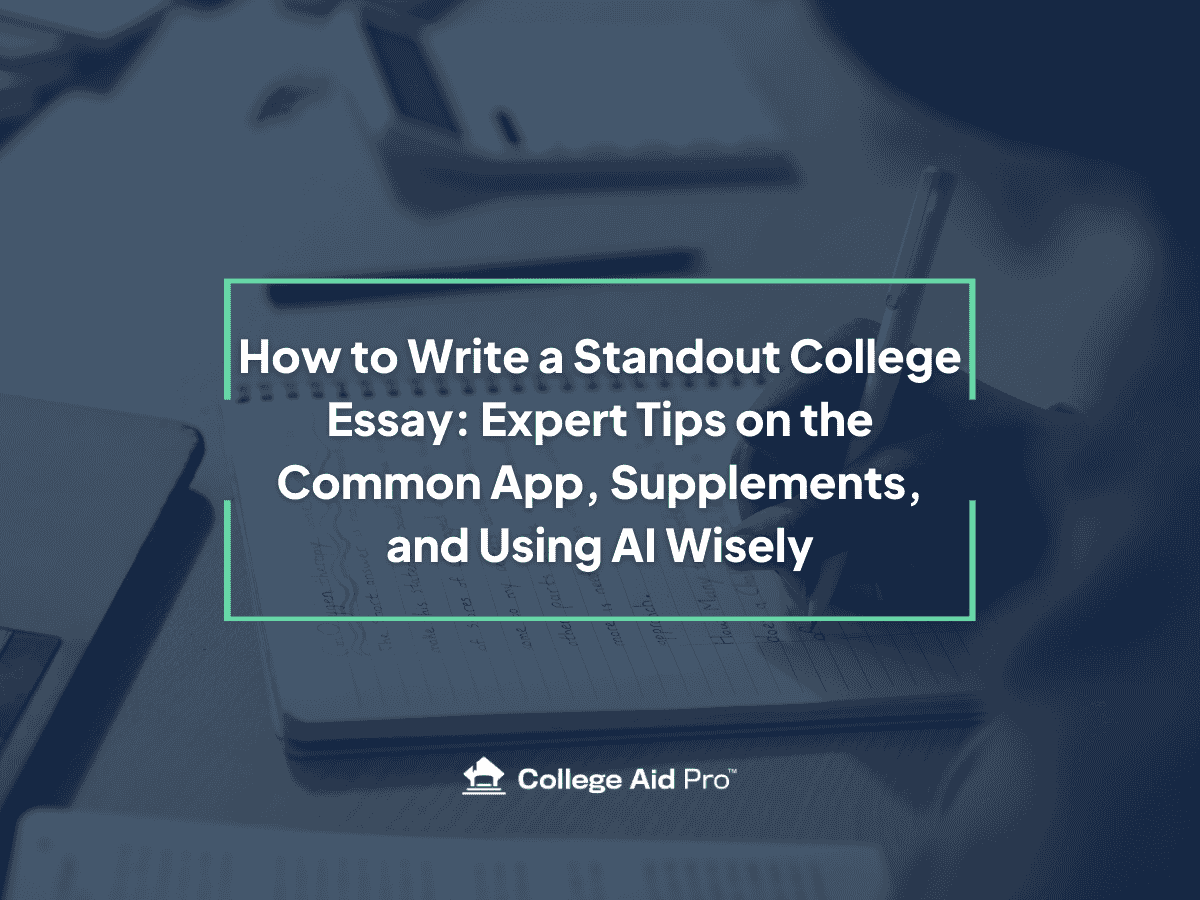How to Write a Standout College Essay: Expert Tips on the Common App, Supplements, and Using AI Wisely
When it comes to college admissions, few parts of the application carry as much weight — or stress — as the essay. Grades, test scores, and extracurriculars are crucial, but essays are where students can shine as unique individuals. For many, it’s the only chance to speak directly to admissions officers and share the personal story behind the statistics.
In a recent College! podcast episode, host Peg Keough sat down with CAP admissions expert Melissa Mieyr to talk about all things essays: from the Common App personal statement to supplemental essays, and even how (or if) AI should play a role. Their conversation was full of practical tips and insights that every student and parent should hear.
Below, we break down the highlights — and share strategies you can use right now to help your student craft essays that stand out.
Start Early — It’s Game Time for Seniors
Melissa’s number-one piece of advice? Start now. Rising seniors (and even juniors) shouldn’t wait until deadlines loom. Essays take far longer than most families expect, and procrastination can lead to rushed, weaker submissions.
“Your big essay can take a three-week cycle by the time you write it, review it, and revise it,” Melissa explains. Supplemental essays add even more to the workload, with many colleges requiring several shorter responses. By breaking essays into weekly goals — for example, finishing one or two essays per week — students can steadily make progress without feeling overwhelmed.
And remember: once school, sports, and activities ramp up in the fall, free time becomes scarce. Tackling essays over the summer and early fall is the smartest move.
The Common App Personal Statement: Finding Your Story
The Common App personal statement is the essay most students know about — 650 words responding to one of several prompts. But Melissa stresses that the actual prompt isn’t what matters most.
“Don’t get hung up on which prompt to choose,” she says. “It’s about telling your story.”
This is the one part of the application where a student can become more than numbers. Admissions officers want to understand who applicants are as people: their values, their perspective, their voice. The essay doesn’t need to recount a life-changing trip abroad or a headline-worthy achievement. Often, the best essays grow out of small, meaningful moments.
Melissa encourages students to brainstorm by listing:
- Important life events (big or small)
- Influential people
- Objects, places, or activities that matter to them
From there, the goal is to dig deep and uncover stories that reveal character. “It doesn’t have to be newsworthy,” she says. “It can be a very small moment that was transformative.”
The key: show, don’t tell. Instead of writing “I’m a great leader,” share a story that proves leadership, whether it’s mentoring younger kids at camp or helping a team navigate a tough season.
Supplemental Essays: Why “Optional” Is Never Optional
Beyond the Common App essay, many colleges require supplemental essays. These prompts range from the classic “Why this college?” to questions about community, leadership, or academic interests.
Melissa warns families not to underestimate the time required for supplementals. Some schools may require multiple essays, each with different word counts and expectations.
And here’s the golden rule: optional essays are not optional. “They’re testing you,” Melissa says. If a school gives you the chance to share more about yourself, take it — unless the question truly doesn’t apply. Skipping an optional essay can make you look less invested.
How to Approach “Why Us” Essays
One of the most common supplemental questions asks: Why do you want to attend this school?
The mistake many students make is staying too general: writing about the beautiful campus, school spirit, or reputation. As Melissa explains, “If you can read your essay back and it could apply to any school, you haven’t done your job.”
Instead, be specific and personal.
- Mention professors you’d like to learn from.
- Reference programs, research opportunities, or clubs that match your passions.
- Connect your past experiences to future opportunities at that college.
This level of detail shows admissions officers that you’ve done your homework — and that you’re genuinely excited to join their community.
The Role of Vulnerability
Peg and Melissa also discussed the role of vulnerability in essays. Sharing struggles, challenges, or personal reflections can make essays powerful — but it’s a fine line. Oversharing or focusing on overly negative details can backfire.
Melissa suggests aiming for authenticity: enough vulnerability to reveal growth and resilience, but always framed in a way that shows how the student has learned and moved forward.
AI and College Essays: What’s Okay and What’s Not
No conversation about writing in 2025 is complete without addressing AI tools. Can students use ChatGPT or similar tools to draft essays? Melissa’s answer: proceed with caution.
First, every college has its own AI policy. Some forbid AI use entirely; others allow grammar or brainstorming help. Students need to check each school’s guidelines carefully.
Second, AI can’t replicate the student’s authentic voice. “A teenager’s writing is very different from polished AI prose,” Melissa warns. “If you use AI, you risk losing that personal element — and admissions officers can tell.”
That said, there are ethical, limited uses of AI in the application process:
- Grammar and spell check
- Condensing content (e.g., trimming long activity descriptions to fit character limits)
- Researching colleges to find unique programs, professors, or opportunities
But when it comes to the personal statement and supplemental essays, the writing needs to come from the student. Not parents, not teachers, and not AI.
Expert Takeaways for Families
Melissa ended the conversation with two crucial reminders:
- Start early. Essays take longer than you think, and deadlines arrive fast.
- Show, don’t tell. Share vivid stories that let admissions officers walk in your shoes.
Peg added that her own daughter’s essay — a story about forming a connection with a homeless man during mission work — tied together her passions, her intended major, and her values. That essay, she believes, helped her daughter gain admission to nearly every school on her list.
Final Thoughts
The college essay process can feel overwhelming, but with the right approach, it becomes an opportunity — not a burden. Essays allow students to showcase their personalities, passions, and unique perspectives in ways transcripts and test scores never could.
By starting early, focusing on authentic storytelling, and steering clear of shortcuts like AI-written drafts, students can craft essays that leave a lasting impression. And when combined with thoughtful supplemental responses, essays can help demonstrate not only who a student is, but why they’re the right fit for a college community.
Remember: Admissions officers read thousands of essays every year. The ones that stand out aren’t always the most dramatic or flashy — they’re the most personal, genuine, and human.
Listen to the Full Episode to hear all of Melissa’s Tips! –> Click Here to Listen!



